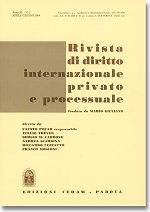CJEU rules on Art. 15 (1) lit. c) Brussels I-Regulation
On 17 October 2013 the Court of Justice of the European Union (CJEU) has handed down its long-awaited decision in Lokman Emrek ./. Vlado Sabranovic. The court held that consumers may sue professionals before their home courts according to Art. 15 (1) lit. c), 16 (1) Regulation 44/2000 (Brussels I) even if there is no causal link between the means used to direct the commercial or professional activity to the consumers’ member state and the conclusion of the contract.
The facts of the case were as followed: Vlado Sabranovic, a resident of France, ran a used car business close to the German border. On his business website he listed several French telephone numbers and a German mobile phone number together with the respective international codes. Lokman Emrek, a resident of Saarbrücken in Germany, learnt about Mr. Sabranovic’s business through friends. He, therefore, went to Mr. Sabranovic and bought a used car. Subsequently, he filed a claim against Mr. Sabranovic in Germany under the warranty agreement. He argued that German courts were competent according to Art. 15 (1) lit. c) 16 (1) of the Brussels I-Regulation because Mr. Sabranovic had targeted his activities through his website to Germany. Mr. Sabranovic, in contrast, argued that Art. 15 (1) lit. c), 16 (1) of the Brussels I-Regulation did not apply. Even though he had targeted his activity towards Germany the contract had not been the result of this activity. Mr. Emrek had never seen his website prior to conclusion of the contract.
In its decision the CJEU argues that the actual wording of Art. 15 (1) lit. c) does not expressly require the existence of a causal link between the targeted activity and the conclusion of the contract. In addition, it argues that there is no need to read an “unwritten condition” into the provision because Art. 15 (1) lit. c) is meant to protect the consumer as a weaker party. Introducing an additional requirement of causality, however, would require consumers to prove that they actually visited a website prior to the conclusion of the contract. This, in turn, could prevent consumers from bringing a suit – and, thus, weaken consumer protection.
The court’s decision is problematic for (at least) two reasons. First of all, while it is correct that Art. 15 (1) lit. c) of the Brussels I-Regulation does not expressly require a causal link between the targeted activity and the conclusion of the contract, the provision requires that the “contract falls within the scope of such activities”. This phrase, however, is usually understood to require the kind of causal link that the court refuses to read into Art. 15 (1) lit. c) as an “unwritten condition”. The court, therefore, does injustice to the wording of Art. 15 (1) lit. c) and ignores the pertaining literature. In addition, it also ignores Recital 25 of the Rome I-Regulation. Recital 25 elaborates on Art. 6 of the Rome I-Regulation and, thus, the provision that was expressly modeled on Art. 15 (1) lit. c). It explains that consumers should be protected if the professional directs his activities towards the consumer’s habitual residence “and the contract is concluded as a result of such activities.” Recital 25, thus, makes clear that Art. 6 (1) of the Rome I-Regulation requires a causal connection between targeted activity and conclusion of the contract. Since Art. 6 of the Rome I-Regulation and Art. 15 of the Brussels I-Regulation have to be interpreted in a coherent and consistent fashion there is little doubt that Recital 25 should also inform the interpretation of Art. 15 (1) lit. c).
Second, the CJEU decision runs counter to the rationale of Art. 15 (1) lit. c) of the Brussels I-Regulation. While it is true that Art. 15 (1) lit. c) Brussels I is meant to protect consumers it does not set out to protect all consumers in all cases. Rather it draws a line between consumers who deserve protection and those who don’t. Consumers who actively go abroad to purchase goods and services without having been motivated by professionals to do so can hardly ever be regarded as being in need of protection. They leave their home country and, therefore, must expect to be subject to the jurisdiction and the laws of a foreign country. The mere fact that their contracting partner – without the consumers’ knowledge – tried to attract foreign consumers is no reason to allow these consumers to rely on Art. 15 (1) lit. c). The CJEU, therefore, pushes the boundaries of consumer protection beyond what the European legislator had in mind – and beyond what is needed.
The full text of the decision is available here, the press release can be downloaded here.

 The seminars on
The seminars on